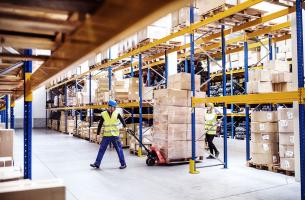
Gary Robinson
Nov 24, 2025
Bridging the AI Talent Gap: Are UK Logistics businesses transforming workforces?
Digitalisation, automation, and cybersecurity are redefining how logistics workforces operate. Drawing on insights from KPMG’s Supply Chain Trends 2025, this article explores the widening digital talent gap across UK logistics, and how employers can adapt recruitment and skills strategies to stay competitive. As specialist procurement, supply chain and logistics recruiters, Cast UK shares practical insights on workforce transformation in the AI era.
The new frontier in logistics transformation
The UK logistics sector is in the middle of a fundamental reset. According to KPMG’s Supply Chain Trends 2025, automation, AI, and digital integration are no longer experimental projects, they’re fast becoming the backbone of how goods are moved, tracked, and optimised.
But as systems advance, so must the people who operate them. The real challenge isn’t just technological it’s talent-based too. The logistics workforce is being reshaped, and employers are competing for a limited pool of professionals who combine operational knowledge with digital fluency.
From automation to analytics: A shifting skills demand
While AI tools and robotics are transforming physical operations, the biggest workforce change is in how decisions are made.
- Data-led logistics - Predictive analytics, smart forecasting, and digital twins are replacing manual processes. Decision-making now depends on professionals who can interpret insights, not just execute plans.
- Automation orchestration - Robotics and IoT systems require logistics managers who can integrate tech with human teams, managing both machines and people effectively.
- Cyber and systems resilience - With digital infrastructure comes exposure. Cyber literacy is now an essential skill within supply chain operations, not just for IT teams.
- Compliance in a connected world - As regulatory frameworks tighten globally, professionals who can navigate digital documentation, cross-border data controls, and supplier compliance are increasingly valuable.
This isn’t about everyone becoming a developer. It’s really about developing a logistics workforce that understands how to harness technology strategically.
The UK’s widening digital skills gap
Across procurement, logistics and supply chain functions, skills shortages are one of the biggest barriers to transformation.
Research shows that over 60% of UK logistics companies report a digital capability shortfall (Neos Networks 2024 UK Logistics Digital Infrastructure Report). That gap is being felt most acutely in roles linked to:
- Data analysis and reporting
- Automation integration
- AI-assisted planning
- Risk and compliance management
As a result, employers face rising competition for a limited number of qualified professionals, and are now being forced to rethink their workforce strategies.
What can employers do to stay ahead?
1. Redefine job profiles for digital operations
Review existing logistics and supply chain job descriptions. Do they still reflect the work being done today? Modern roles should emphasise analytics, systems fluency, and cross-functional collaboration.
2. Build hybrid career pathways
Employees who understand both operations and technology are the most adaptable. Create opportunities for team members to upskill in areas such as data interpretation or process automation.
3. Make digital learning a retention tool
The best candidates want growth. Embedding structured digital training and certification within your L&D strategy can reduce turnover and attract forward-thinking talent.
4. Partner strategically for specialist recruitment
In a market evolving this fast, speed and insight matter. Working with recruitment specialists who understand the logistics landscape ensures access to candidates who combine hands-on experience with future-ready skills.
5. Refresh your employer brand narrative
Highlight innovation, investment in technology, and opportunities for skill growth. Many logistics firms underestimate how much this messaging influences digitally minded candidates.
Why workforce transformation matters now
Digitalisation is not a distant horizon - it’s here. AI, automation and advanced analytics are changing what success looks like in logistics. For employers, the next few years will define whether transformation leads to efficiency and growth, or creates deeper capability gaps.
Here we’re already helping organisations recruit for this future: placing professionals who can combine technical literacy with operational excellence.
If your business is investing in automation, data systems or digital supply chain transformation, now is the time to rethink your people strategy. The right talent doesn’t just adapt to change, it drives it.
If you’d like help mapping out your organisation’s skills requirements why not chat to us?


